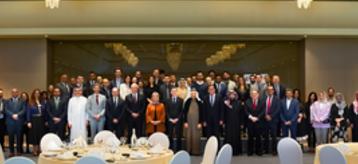Islamic Financing

Islamic finance with a technological twist has been given a boost in Bahrain with the creation of a central gathering of like-minded entrepreneurs and forward-thinkers.
The Global Islamic & Sustainable FinTech Centre (GISFC) has been launched with local, regional and international members and its backers believe it reaffirms Bahrain’s position as a global leader in Islamic finance and banking.
The move aims to build on Bahrain FinTech Bay’s (BFB) diverse network of partnerships locally, regionally and internationally, and help accelerate the use of FinTech to drive the next phase of growth in Islamic finance, whilst also focusing on sustainable, social and responsible innovation.
Khalid Saad, CEO of Bahrain FinTech Bay said: “Islamic finance has the potential to on-board more than a billion new customers through the use of technology, helping attain sustainable and long-term growth.
“Additionally, the world is increasingly shifting towards innovation that promotes sustainability. Through the launch of GISFC, we aim to bring together key stakeholders in the industry to help shed light on how FinTech can help attain such growth in a sustainable and responsible manner.
“As a leading regional FinTech and global Islamic finance hub, Bahrain is at the forefront of driving Islamic and sustainable Fintech.”
Leading the charge will be Dr Ali Adnan Ibrahim who has been appointed as chairman of GISFC. He brings a wealth of experience in sustainability and Islamic finance.
For example, he is head of sustainability & social responsibility at the Al Baraka Banking Group in Bahrain. He’s also a World Economic Forum Young Global Leader and leads the Social Credits Initiative which seeks to combine finance and technology to incentivise private investments for sustainable development, and is chairman of the Sustainable Development Committee of the Bahrain Association of Banks.
Dynamic Dr Ali has been published internationally and his areas of interest and expertise include Islamic and sustainable finance, impact investing and blended finance, market-based strategies for financial inclusion and enterprise development, the intersection of impact and faith, microfinance, foreign direct investments and financial regulation.
Khalid said he was ‘delighted’ to have someone of his calibre to head such an ‘important initiative’ and Dr Ali is equally happy to be stepping forward, saying he was ‘deeply honoured’ by the trust shown in his ability.
“Islamic finance and sustainability share a huge common ground,” Dr Ali said. “While Islamic finance is fast approaching the three trillion dollar mark, sustainability is one of history’s biggest disruptors.
“Islamic and sustainability FinTech solutions can help solve several social and economic challenges, and, while doing so, such solutions will create massive economic value including investment opportunities for individuals and businesses.
“Bahrain’s Fintech and Islamic finance regulatory ecosystem can help Islamic and sustainability Fintech startups from the region and beyond, building on Bahrain’s position as a global centre for Islamic and sustainable FinTech.”
GISFC’s launch partners include the Accounting and Auditing Organisation for Islamic Financial Institutions (AAOIFI), the Islamic Corporation for the Development of the Private Sector (ICD), South-East Asia’s Islamic Fintech Alliance, Ethis Ventures - an Islamic crowd-funding platform across Malaysia, Indonesia and Singapore, Al Baraka Banking Group – the world’s largest Islamic banking network, Al Salam Bank, Arab Financial Services, Arcapita, Bahrain Institute of Banking and Finance, Bahrain Islamic Bank, Finastra, Finocracy, GFH, IdealRatings – a FinTech focused on Islamic finance and sustainability headquartered in the US, Ithmaar Bank, Kuwait Finance House, Roland Berger and Waqfe.
GISFC aims to attract more partners as it seeks to drive the Islamic and sustainability FinTech development agenda and to focus on providing ‘thought leadership’ and expertise in shariah compliant FinTech.
Globally, major centres of Islamic finance have been undergoing regulatory reforms and introducing initiatives such as regulatory sandboxes to encourage further innovation in their ecosystem.
Such innovations are aimed at allowing the industry to capture new customers and achieve long term growth. Additionally, sustainability has become a central and strategic focus for financial institutions worldwide.
The future of Islamic FinTech is bright, according to globally recognized digital financial advocate Lawrence Wintermeyer and Abdul Haseeb Basit the UK not-for-profit FinTech members association, in an article published in Forbes magazine last year.
The global requirement for digital infrastructure investment is an opportunity for Islamic banks, asset managers and investors to harness through Islamic FinTech both in Islamic and non-Islamic economies, they added.
Islamic Fintech offers the opportunity to transform the lives of millions of people globally, and to help transform the Islamic FinTech hubs into 4thIndustrial Revolution digital leaders.
Islamic Finance is faith based and complies with Sharia law which prohibits usery fees such as interest, and has prohibitions such as alcohol.
The Islamic FinTech landscape maps more than 120 players globally from Islamic exchange-traded funds to crytpocurrencies.
Source: http://www.gulfweekly.com/Articles/39762/Islamic-Financing


